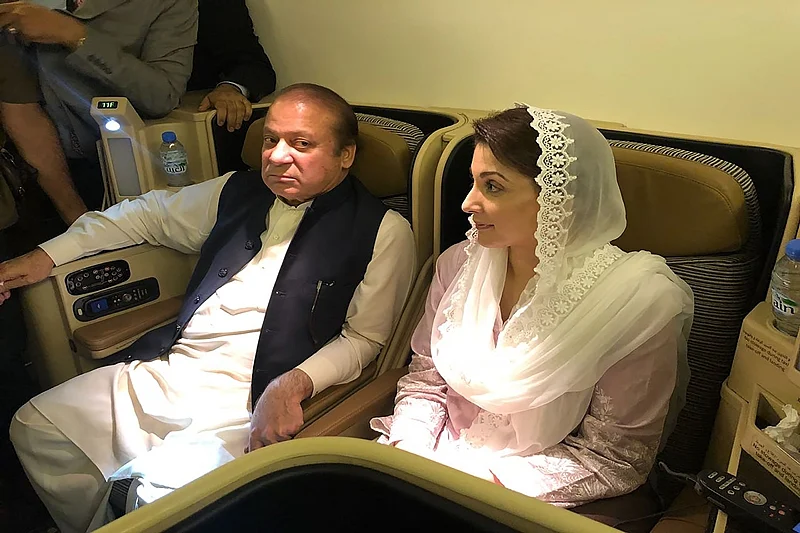Pakistan is in deep turmoil even as it prepares for a general election which the country’s powerful army is seeking to influence, notwithstanding its denials. With a so-called National Accountability Bureau having convicted former prime minister Nawaz Sharif and his heir-apparent daughter Maryam, on corruption charges for the family owning four posh apartments in an upscale area in London with ill-gotten money, the army’s current favourite, ex-cricketer Imran Khan could well don the mantle. Nawaz and Maryam have returned to Pakistan from London and have been whisked away to jail from the airport. Their first task, now, would be to file appeals against their conviction for form’s sake, knowing full well that the appeals would not find favour. Nawaz said in London that he is being sent to jail because he tried to free the people of Pakistan from the slavery imposed on them by some generals and judges and vowed to continue his political struggle from behind the bars. Most Pakistani media groups remain critical over the conviction of Sharif and Maryam, saying the extremist and sectarian religious parties that are rapidly mainstreaming with official encouragement may benefit from this judgement.
For Nawaz Sharif, this is a dangerous gamble he has taken, relying on overwhelming public support. No one has cocked a snook at the army the way he has. He has left his wife Kulsoom behind in a London hospital on a ventilator machine and can be expected to evoke sympathy. Both he and Maryam have been debarred from contesting elections but their party, the Pakistan Muslim League (Nawaz) is in the fray. So worked up is Imran Khan over Nawaz’s return that he said in a statement just before his return that those greeting Nawaz would be donkeys, a remark that has incensed his legion of supporters. Another claim of Nawaz has been that he is being hounded because he wants peace and friendship with India which is anathema to the Army. That there is a constituency in Pakistan that wants durable peace with India is a heartening sign indeed. For the first time in recent years, shrill anti-India propaganda has been largely absent in the electoral campaign of parties.
While Nawaz braces up for elections, he is handicapped by the fact that he has not been able to carry conviction when he denies wrong-doing on the corruption front. Facing mass turmoil and suppression on the political front, the army and the police in Pakistan are preparing for unrest. In the process, there is a groundswell of anger against the hitherto much-respected army which is bound to come under a cloud given the present situation. The elections on July 25 will be watched with keen interest. How credible the results would be and what kind of forces it would unleash remains to be seen. The army on its part is somewhat worried that it is losing public support and is distancing itself from the impending results of the election, claiming that it is a neutral observer.
Adding to the country’s discomfiture is the growing realisation that the much-heralded China-Pakistan Economic Corridor readying for opening next year may shatter the country’s economy and make it hopelessly dependent on China. A few months ago, Islamabad withdrew its request to include the $14-billion Diamer-Bhasha Dam in the CPEC project citing strict monetary conditions on Beijing’s part as being against the country’s national interests. There are fears being expressed in Pakistan that its sovereignty could be jeopardised by China’s extortionist interest rates on loans for infrastructure projects.
There is the example of Maldives where sovereignty has been compromised by President Abdulla Yameen’s brazenly pro-China tilt so much so that Maldives’ sovereignty is already hostage to loans taken from China. Sri Lanka, too, is a victim of Chinese debt diplomacy. A few months ago, Hambantota Port was handed over to a Chinese state-owned company under a 99-year lease deal. The $US1.1 billion ($1.4bn) deal was the only option for an administration that inherited a mountain of Chinese debt on a series of infrastructure follies it had no capacity to service. The cold reality is that Islamabad’s emerging economic model is becoming too dependent on China. However, at the same time, the country doesn’t have any other viable economic plans to revive its choked economy and domestic financial base. Evidently, Pakistan is heading for hard times politically as well as in terms of economic viability.






